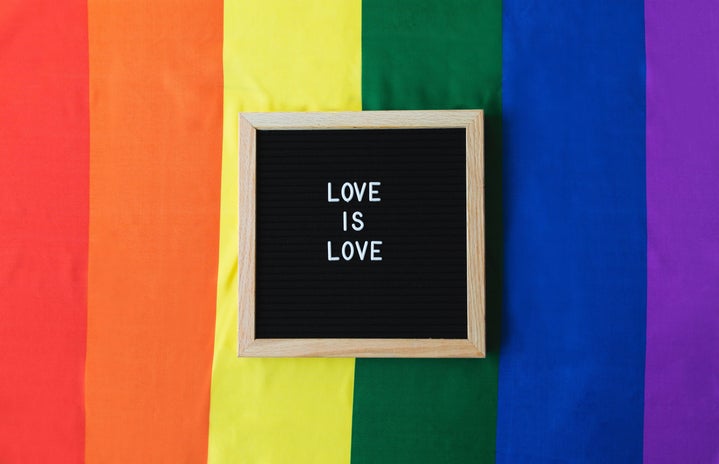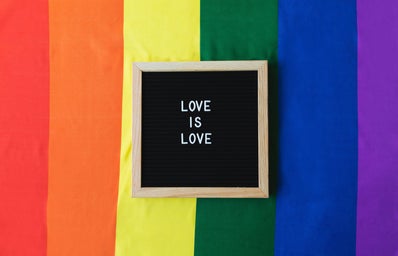Most of us now know the meanings of terms like lesbian, gay, bisexual, and transgender, which is thanks to a great amount of progressive change and understanding that has taken place over the past decade. As we get ready to enter the new year, this time of progressive understanding seems to continue with more of the lesser represented LGBT+ communities and their associated terms showing up in television, social media, and other popular forms of expression. These words that have yet to become a part of mainstream society provide a wonderful opportunity for refreshing characters and stories to be explored regarding different LGBT+ communities in our modern culture. So, whether you are here expanding your knowledge of LGBT+ terminology or simply here to find out what a word that your favorite character or influencer just referenced, you are in the right place. Here are a few LGBT+ terms that you need to know before the year 2020!
Queer is an umbrella term of sorts that is used when people identify themselves as outside of sexuality or gender norms. Some may identify as queer when they may not be comfortable with certain gender/sexuality norms while others may identify as queer because they feel they don’t fully identify or fit into said norms. Before LGBT+ communities become widely accepted in society, the term queer was used as a derogatory term to bully and/or shame people who expressed gay tendencies or who did not fit with traditional gender/sexuality (cisgender/straight) standard at the time. In the modern-day, the word carries a different, more positive connotation. The ever-growing number and popularity of television shows like Queer Eye, coming out stories of famous celebrities such as Neil Patrick Harris, and the rise of openly LGBT+ YouTubers like Thomas Sanders may have helped with the destigmatizing of the word. However, some people may still associate the word with how it was traditionally used and may find it offensive or distasteful, so be respectful.
Pansexual is most commonly defined as sexual orientation where someone can be sexually attracted to a person with little to no influence by that person’s gender identity. It is commonly compared to bisexual except it is often considered to be more inclusive to transgender and non-binary communities. That said, however, bisexuality does remain as its own separate community. (Feel free to check the resources at the bottom of the page if you would like to learn more about the technical ways to define bisexual.) Perhaps two of the most notable representatives of pansexuality in modern culture are the renowned music artist, Sam Smith, and David Rose played by Daniel Levy from CBC’s original sitcom, Schitt’s Creek. As someone who personally identifies as pansexual, I see these and many other representatives of pansexuality becoming more notable in society makes me feel so proud to be part of such an amazing community. It is so exciting to connect with a person/character whose struggles and experiences I can strongly relate to.
Asexual
Asexual is generally defined as an individual who experiences little to no sexual attraction or desire for sex. Asexuality like many other LGBT+ communities is often viewed as a spectrum with varying levels and identities that are based on that person’s levels of attraction (emotional, spiritual, romantic, etc.). It is important to note that asexuality is different from celibacy which means abstaining from sex. Celibacy is regarded as a lifestyle choice to abstain from sex while asexuality is simply not having the drive or desire for it in the first place. Sometimes you may also see terms like “ace” or “aces” used when referencing a person or persons who are asexual. This is can found in the incredibly popular Netflix original show, BoJack Horseman, where one representative of asexuality from modern culture Todd Chavez is starred. In the shows fourth season we get to see Todd’s journey into discovering his asexuality and how he rediscovers what he needs/wants from his future and current relationships. It’s a very refreshing story and I highly recommend watching it yourself if you haven’t already.
I hope this was helpful in informing and communicating these LGBT+ terms. Remember, there are many terms and communities, LGBT+ related and otherwise, that have yet to make their way into modern culture. You should always keep an open mind when hearing about them, and to be one the lookout for when these terms are used in popular media.
Most importantly of all, the only person who can label you is you, and if you don’t want a label that’s ok, too. Just be yourself!
Did you learn something new? Do you know any other LGBT+ terms that you think people should know in 2020? Let us know on @hercampuslatech on Instagram. We would love to hear from you!
Resources:
The Trevor Project
https://www.thetrevorproject.org/trvr_support_center/glossary/
The National LGBT Education Center
https://www.lgbthealtheducation.org/wp-content/uploads/LGBT-Glossary_March2016.pdf
Human Rights Campaign



